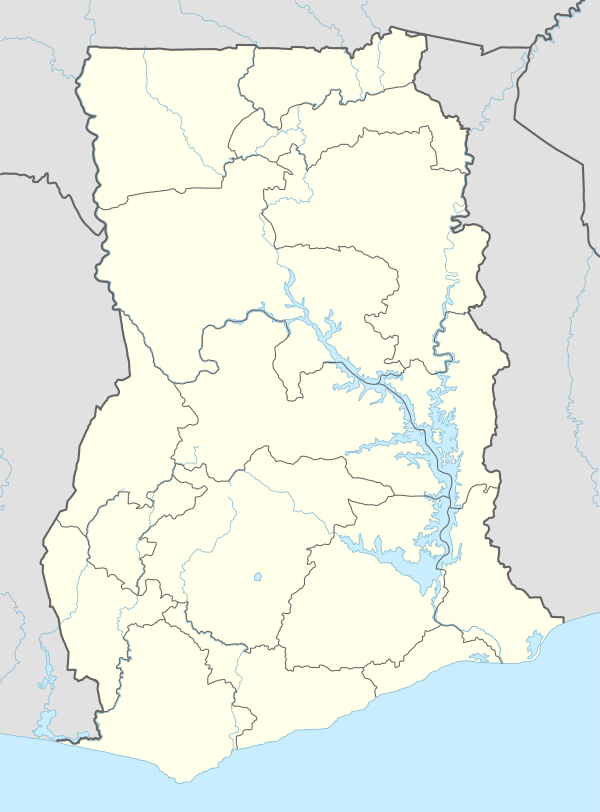Paga Crocodile Pond
Paga Crocodile Pond is a sacred pond in Paga in the Upper East Region of Ghana, which is inhabited by West African crocodiles. Due to the friendliness of the reptiles, it has become popular among tourists and the pond is now reliant on tourism to ensure the population of crocodiles remain fed and healthy. It is also known as Zenga Crocodile Pond.[1]
| Paga Crocodile Pond | |
|---|---|
IUCN category IV (habitat/species management area) | |
 Visitors touching a crocodile | |
 | |
| Nearest city | Bolgatanga |
| Coordinates | 10°59′06″N 1°06′33″W |
Description
The pond is located in Paga in the Upper East Region of Ghana, and is 44 kilometres (27 mi) outside Bolgatanga, the regional capital. It is inhabited by wild West African crocodiles, with some up to 90 years old.[2] The crocodiles are so tame that local children can swim in the pond alongside them without being harmed.[3] Paga is known to be a trade center for centuries and closer to the Burkina Faso border. During the period of the slave traders in mid 1800s, they use Paga as a gateway to the Gulf of Guinea which points from the north. [1]
History
The locally told origin of the pond was that a crocodile brought a dying man to the pond to drink, who after surviving, declared the pond to be sacred and that no harm should come to the crocodiles. This legend of the crocodiles is claimed to date back to about 600 years. The crocodiles are considered to be totems for these local people.[1][2] Another story states that a man was trapped against the water's edge by a lion, when he bargained with a crocodile that none of his children would harm his kind if he would kill the lion.[3] It is believed that the souls of the people of Paga resides in these crocodiles.[2] It is an offence to kill crocodiles in Paga, or eat crocodile meat.[4]
Tourism
The crocodiles at Paga are very friendly.[5] Visitors can sit, touch and take photographs with the crocodiles. The crocodiles roam freely throughout the pond, and are brought to the shore when the guides whistle loudly. Tourists can then take photographs while holding the crocodile's tails, after the guide has fed them a chicken.[6] There are concerns that the pond is now too reliant on tourism, with caretaker Salifu Awewozem saying in 2009 that the elderly crocodiles require specialist care, and the only time additional food is provided to the reptiles is when tourists pay for the chickens when they pose for photographs.[4] Tourists use Paga as an opportunity to see preserved slave camps. The also enjoy village tours and evening drumming and dancing by any local cultural group could be arranged for them.[1]
Tourists Site in Paga
The Pikworo Slave Camp is located in Paga- Nania. It was created purposely for holding slaves that are brought down from the north. Slaves were forced to walk about 150km to the south to the slave market at Salaga. They are then taken to the coast for shipment.[1]
The mystery dam of Kayoro called Kukula and the Nasaga Game Reserve about 8km from Burkina Faso and Paga.[5]
References
- "Visit Ghana | Zenga (Paga) Crocodile Pond". Visit Ghana. Retrieved 2020-08-11.
- Anane, Benedicta (6 August 2011). "The Paga crocodile pond". My Joy Online. Retrieved 22 May 2014.
- "In Ghana's Paga Ponds, kids swim alongside "friendly" crocodiles". Pulse.com.gh. 30 December 2015. Retrieved 1 November 2016.
- "Paga Crocodile Pond In Danger". GhanaWeb. 9 September 2009. Retrieved 1 November 2016.
- Editor (2016-03-21). "Paga Crocodile Pond". touringghana.com. Retrieved 2020-08-11.CS1 maint: extra text: authors list (link)
- Robb, Simon (19 May 2016). "Is this the most dangerous holiday snap ever?". The Metro. Retrieved 1 November 2016.
| Wikimedia Commons has media related to Paga Crocodile Pond. |